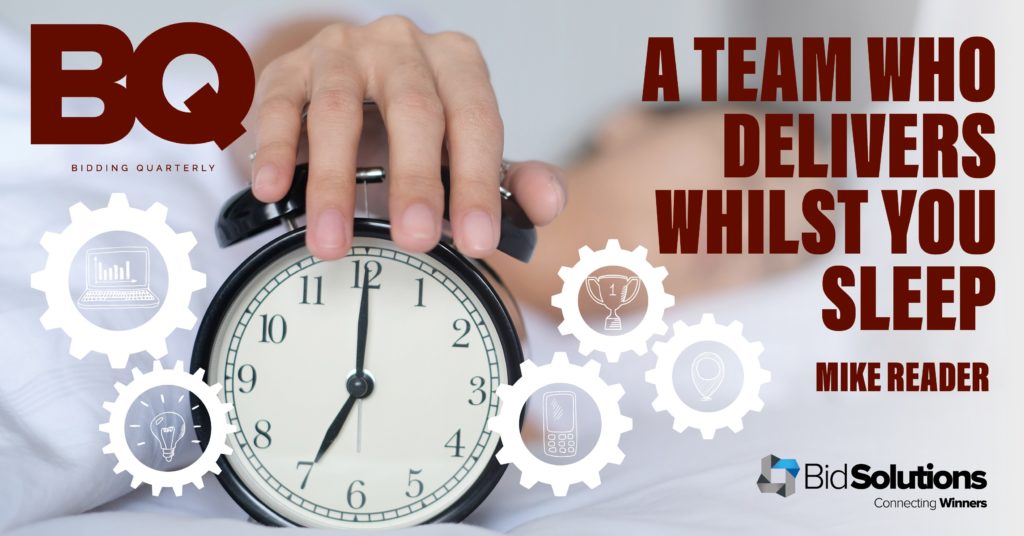
In an industry where time is a scarce commodity, the idea of establishing a global bid team can be very attractive to a time-poor bid leader. I’m sure many of you have thought about 24 hour working, with a connected and collaborative team around the globe. The potential benefits that could be gained from having a team who work whilst you sleep, and who share workload, skills and experience across time zones, could well be the ultimate productivity hack. What could go wrong?
At Mace, we are currently on a journey to build global bid capability and capacity while ensuring we can support proposals in our offices around the world. The dream of efficient 24 hour working and connectivity still feels a long way away for us. I have realised we’ve had to work harder than ever before to build the right team culture and break down barriers within our 40+ person team.
We’ve had to be consciously more inclusive. We’ve had to go above and beyond to ensure our team in London gets to know our colleagues in Mumbai, Mauritius, New York, Dubai, the Philippines and (often just as hard) other cities in the UK!
Zoom and MS Teams becoming mainstream business tools has certainly helped – but I can share other experiences I hope will help you in your pursuit of the ultimate global bid team.
1. Not everyone works the same and we must adapt to their work style, not expect them to work to ours.
It feels obvious when you see it in print, but not everyone is the same. And culturally, different countries have different working practices, priorities and work styles. A key consideration for us when seeking to bridge cultural differences is understanding what makes each individual tick.
Some of my team need help switching off. For colleagues in India and central Asia, it is not normal to say “no” or that they have too much work on. We have to carefully monitor the demands we put on them, and also the demands they receive from their colleagues in the office. If we didn’t put in safeguards and clear reporting on activities and time on the job, it’s quite conceivable colleagues would be working through the night on a regular basis.
In other areas, work/life balance is much more defined. A clear start and end date, at least an hour for lunch away from desks and plenty of quiet time to work on individual tasks has been typical of colleagues in mainland Europe. Here, respecting these boundaries and being honest with what’s achievable in the workday helps everyone to understand what’s going to be delivered, when, and to what quality.
2. Communication matters and it takes time to get right.
Perhaps it’s another obvious statement, but language barriers are a genuine challenge – particularly when communicating tasks, reporting progress updates and seeking feedback.
Our business’s primary language is English and it’s easy to forget that for some of the team, it’s not their first, second or even third language. Written communication has often proved more effective when communicating tasks, deliverables and actions, but even this can sometimes fall foul of some nuances in language. Repetition has been our friend when communicating across borders, both when seeking feedback (so we understand what our colleagues are telling us) and also when we’re asking for support or communicating a task or deliverable.
But nothing beats face to face interaction. With the lifting of flight restrictions, I’ve been fortunate to visit members of my team outside the UK. I’ve found there is no substitute for spending time with them, coffee in hand, just finding out more about who they are. This has helped us build closer relationships and, ultimately, understand our communication styles and drivers better. (All my flights are offset as part of Mace’s commitment to being a net carbon zero business.)
3. A strong bid process is critical and creates a common bid language across our team.
Anchoring clear communication is part of our strong, logical and sometimes overly detailed bid process. My team has done amazing work in codifying the way we work and capturing that within 31 activity guides, countless standard templates, and training and support to help translate the approach to different types of bids.
Having a clear process means we have a clear bid language in our team. Everyone understands what’s expected of a pink review, or what will be provided to writers when they’re engaged, or how to navigate our sometimes complex approval and sign-off processes.
It’s made us stronger to work in one unified way. It’s also meant that as our team has expanded globally, those joining us have a solid foundation from which they can build quickly and speed up onboarding (which can be more challenging across time zones).
These three learnings – adapting our style to suit others, focusing on clear communication and anchoring our method of operation on a strong but adaptable bid process – set us in good stead for the future. Whether you’re starting out with your first international hire or if (like us) you’re seeking to grow and expand an existing team, I strongly recommend these three elements as a solid foundation for you.
Where do we go next?
Mace is targeting growth of 20% each year up to 2026, from a £2 billion turnover in 2020. A large part of that growth will come from outside the UK. This means my team will continue to grow, develop and respond to the entrepreneurial drive which has presented opportunities as varied as delivering new schools in Peru, metro lines in Canada and new cities in the Kingdom of Saudi Arabia.
The world will continue to be more connected. Professionalism and competency in our industry will continue to grow globally as we move through the 2020s. Global teams working together will become more and more common in our profession. We need to embrace our differences to make sure we act and work as one joined-up, work-winning team.
This article was written by Mike Reader.
Mike Reader is one of the UK’s leading work winning professionals, helping senior leaders navigate the bidding and sales world. He leads a specialist team at Mace who work across all continents pursuing mega built environment and infrastructure projects. He also loves cold water swimming, politics and good food.

